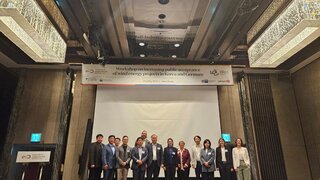Workshop "Acceptance of Wind Energy Projects"

On 23 May, the acceptance workshop on offshore and onshore wind took place in at the JW Marriott Hotel in Seoul moderated by Ms. Jana Narita from adelphi the workshop was an activity decided by the Working Group “Energy Transition” of the Korean-German Energy Partnership between the German Ministry for Economic Affairs and Climate Action (BMWK) and the Korean Ministry of Trade, Industry and Energy (MOTIE). With about 72 participants, the event was well attended, which speaks for the great interest in the topic of "promoting the acceptance of wind power". The format was very well received and participants engaged in lively discussions.
At the beginning of the workshop, the current developments in Korean and German wind policy were presented by Mr. Do-Youn Yim from Korea Energy Agency and Mr. Anton Hufnagel from BMWK. Afterwards, several questions were directed at both presenters, demonstrating the great interest in the Special Bill for Offshore Wind Generation in Korea and as well as the interest from the Korean side in the attitude of the German population regarding rising electricity prices. Mr. Hufnagl explained that in Germany, while gas prices have risen very sharply due to the purchase of more expensive LNG during the energy crisis, the generation of electricity through renewable energies has stayed at a relatively low level. Therefore, the acceptance by the public of renewables continuous to be very high This was followed by presentations by Irina Rau from IZES, Dr. Ko-Jang Cho from the Korea Environment Institute and Tae Wan Yoon, CEO and founder of Root Energy, who dealt in detail with research and concrete best practice projects on social acceptance and public participation of citizens in Germany and Korea. In particular, they addressed common reasons for the rejection of wind power and strategies on how acceptance can be structurally promoted. One conclusion that emerged from all presentations was that early involvement of citizens in the development of projects is crucial for local approval and acceptance of wind power. Various models for the participatory and financial involvement of citizens in wind power projects were also presented.
In the subsequent panel discussion, moderated by Deokhwan Choe from the Korea Wind Industry Association and panelists from Baywa r.e Korea, Korea South-East Energy Company, RWE Renewables and the Korea Maritime Institute, questions on the overall social acceptance of renewable energies, as well as the planned and possible expansion speed of offshore wind, the rights and needs of fisheries, the expansion of the grid connection of offshore wind and many other topics were discussed.
Finally, Ms. Wiebke Heider, mediator and facilitator of Energiewende Mediation, gave an insight into the work of conflict resolution of wind projects in Germany and shared her experiences with methods of mediation to solve problems with acceptance of wind power.
The workshop was successful all around: 6 presentations, a panel discussion and an interactive discussion round took place during the day. In particular, the facilitated discussions in the final item on the agenda, the "World Café", where participants rotated to discuss each of the three topics "Financial Participation", "Citizen Participation and Conflict Facilitation" and " Social Acceptance of Zero-Carbon Energy Systems", should be highlighted as a valuable session where each participant had the opportunity to contribute their own perspective and experience.